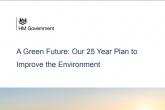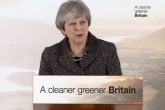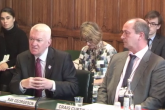EAC launching inquiry into 25 Year Environment Plan
Parliament’s Environmental Audit Committee (EAC) has announced a short inquiry into the government’s 25 Year Environment Plan, to scrutinise its proposals and how they will be enacted.
The Plan, originally promised in 2016 but subject to repeated delays, was finally launched in a speech by Theresa May on 11 January, and sets out the government’s long-term intentions for environmental policy. The Prime Minister focused primarily on what she called the ‘scourge’ of plastic waste, announcing a headline target of zero ‘avoidable’ plastic waste by 2042, while also covering ten general environmental goals.
The cross-party EAC, which examines the actions and performance of government in regard to environmental protection and sustainable development, will be holding one oral evidence hearing, followed by a hearing with the government, to look at ‘how the government intends to make the plan a reality, and whether the targets and timeframes are ambitious enough’.
Written submissions of evidence from the public are being accepted until 5pm on 28 February. Questions to be covered include:
- To what extent does the Plan set a sufficiently ambitious agenda across government?
- To what extent will the government’s proposals for reporting on the Plan allow for proper scrutiny of its performance?
- Are the commitments to legislative action in the Plan sufficient to ensure it will endure beyond the current Parliament?
- To what extent does the Plan set out effective delivery mechanisms to ensure Defra, other government departments and public bodies have the resources and responsibilities to meet it?
The EAC will also be considering the proposal contained in the Plan for an independent statutory body to ‘champion and uphold environmental standards as we leave the European Union’, questioning what legal basis this body should have, as well as what principles should be set out to underpin environmental policy-making post-Brexit.
Mary Creagh, EAC Chair, spoke specifically on the impact of Brexit on the UK’s environmental protections: “My committee has been clear that environmental protections must not be weakened as a result of leaving the European Union. EU laws which protect our natural spaces and native species risk becoming zombie legislation, and my committee has previously called for a new Environmental Protection Act that enshrines targets on waste, water quality and air pollution in law.
“It is crucial that current targets aren’t dropped or missed, that legal protections are not weakened, and government departments aren’t let off the hook."
A previous inquiry by the EAC into the effects of disposable packaging was instrumental in raising awareness and gathering industry expertise prior to the release of the Plan. Two reports resulting from the inquiry, on plastic bottles and single-use coffee cups, drew public attention to the devastating environmental impact of throwaway packaging, and both called for reform of the UK’s producer responsibility scheme, which controls how much producers pay towards the cost of collecting and recycling their products.
The committee’s call for a new system to incentivise design for recyclability and charge more for those producers using hard-to-recycle materials was partially answered with a promise to ‘encourage producers to take more responsibility for the environmental impacts of their products’. However, Creagh expressed disappointment at the scope of the Plan, saying it “delays answering the hard questions over how to tackle plastic pollution”.
More recently, the EAC has been holding hearings with industry and government representatives to discuss the impacts of China’s waste import ban on the UK waste industry, which was labelled the “biggest problem the UK recycling industry has ever seen”, though Resources Minister Therese Coffey told the committee on 31 January that she would “challenge the view that it’s a crisis”.











